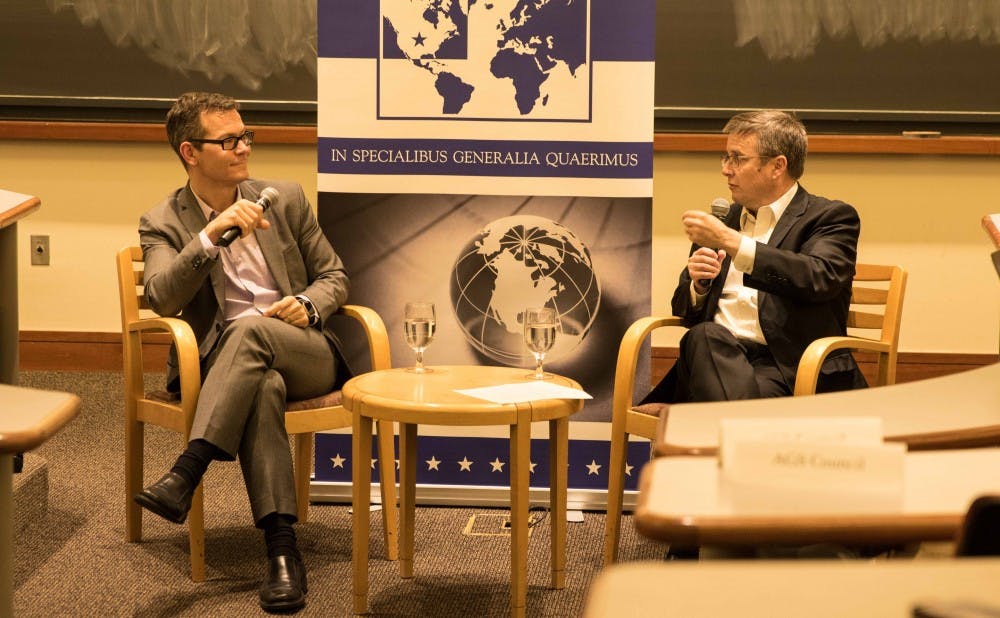Colin Kahl, national security advisor to former-Vice President Joe Biden and current associate professor at Georgetown University, spoke Wednesday at the Sanford School of Public Policy about his foreign policy experience and what to expect from President Donald Trump.
The talk—which was moderated by Peter Feaver, professor of political science—was attended by about 75 community members and students and focused on Kahl's role in the White House, which ended after Trump's inauguration last Friday.
“Scholar-practitioners go in and out,” Feaver joked about Kahl. “When the right party’s in power, they’re in, and if not, they are lowly professors at Georgetown.”
Reflecting on his experience working for Biden, Kahl revealed that he did not have a close relationship with the vice president prior to his appointment. However, he grew to know him through repeated travel to Iraq, where he said Biden had a major diplomatic role.
Feaver noted that although it is "quaint" to think about now, Biden was considered “gaffe-prone” by many in the media, Feaver said. Kahl added that on his first day as national security advisor in 2014, Biden accidentally insulted Turkey, Saudi Arabia and the United Arab Emirates in an address at Harvard University.
“My early impressions of him, which were sustained across the two and a half years I’ve worked for him, are that he’s exactly as he appears. He’s an extraordinarily genuine and authentic person," Kahl said. "And, call it what you will, he’s very aware of who he is and how he’s perceived, and something he says all the time is, ‘the problem is not that I say what I mean, it’s that I say everything that I mean.’"
Kahl also explained exactly why the vice president, who has “almost no power” constitutionally, would need a national security advisor.
“Over the years, vice presidents—especially those who have had close relationships with presidents—have been given a slice of the policy portfolio to pursue,” Kahl said. “Obviously, Dick Cheney was a very influential voice in foreign policy, but I think that changed as the White House became more adversarial. Biden and Obama for the most part were on the same page and had an extraordinarily warm relationship.”
The close relationship between Biden and Obama was in fact a popular topic, and Kahl said they "consider each other older and younger brothers."
Now that Kahl no longer holds a position in the White House, he expressed his fears about the Trump Administration. He said he thinks that Trump considers economic interests more important than geopolitical ones, particularly in respect to China—an approach that Kahl said is the opposite of what the Obama Administration tried to take.
“I have moderate confidence that [Trump’s foreign policy appointees] will make sensible recommendations, and no confidence that the right decision will be made," Kahl said.
He also voiced concerns about informal advisors like Trump’s son-in-law Jared Kushner, who has recently been named a White House senior advisor, as well as what Kahl called the slow pace of appointments during Trump’s transition.
“It was messy. It was extraordinarily messy,” Kahl said. “I have real concerns about the process and extraordinary concerns about the man.”
His biggest fear though is that Trump will destabilize other countries' view of the United States as a world power and an ally.
“Our allies are freaking out across the world,” Kahl said. “Listen to Trump’s inaugural address. ‘America First’ is about looking out for our own interests, and that’s not in the U.S. grand strategy, for both parties, since the second World War.”
Kahl predicted problems in Venezuela and between India and Pakistan relatively soon, in addition to potential problems with North Korea testing nuclear missiles and ongoing concerns in the Middle East with the Islamic State.
But in closing, Kahl urged students to retain their faith in the good aspects of government that are unrelated to the president and to keep pursuing government jobs if they desire.
"If you think you can do a good job, you respect your superiors and you understand your moral and ethical redlines, then you should do it because your nation needs you,” Kahl said.
Get The Chronicle straight to your inbox
Signup for our weekly newsletter. Cancel at any time.

